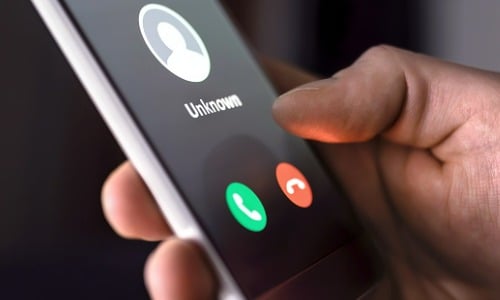
Did you know scammers often act like the Internal Revenue Service (IRS) in order to steal taxpayers' information? Scammers often place fraudulent phone calls, send emails, text messages or social media messages pretending to be from a legitimate source. It is important for you to understand how the IRS properly contacts you, so you aren’t the victim of tax ID fraud or identity theft.
According to the IRS, here’s how the IRS will contact you:
- Mail
Typically, the IRS will first contact you by mail with a notice or a letter. Your notice or letter will explain the reason for the contact and give you instructions on how to handle the issue. Check if your notice or letter is valid by checking your secured IRS online account. Keep in mind, scammers posing as the IRS often contact you claiming they have already sent you a letter or notice. - Phone call
After the IRS mails you a letter or notice, they may call you. IRS revenue agents, tax compliance officers, or private debt collectors contracted by the IRS may call a taxpayer or tax professional. Keep in mind, the IRS does not leave pre-recorded, threatening messages. Many scammers of tax ID fraud threaten taxpayers by claiming if you do not call back, there will be a warrant issued for your arrest. -
In-person visits
Be aware, IRS revenue officers and agents might make an unannounced in-person visit to your front door or business. IRS revenue officers will make an in-person visit to request payment of taxes owed by the taxpayer. Remember, payment will never be requested to a source other than the U.S. Treasury. If you are visited by someone claiming to be the IRS, always ask for credentials.Credentials you should request before giving your information:
• A pocket commission
• Personal Identity Verification Credential (PIV) or also known as LincPass, Smart Card, and CAC card
The IRS sends notices and letters for the following reasons:
• You have a balance due
• You are due a larger or smaller tax refund
• They have a question about your tax return
• To verify your identity
• To get additional information
• To notify you they changed your tax return
• To notify you of delays in processing your return
The IRS calls you for the following reasons:
• To confirm an appointment after mailing you a letter first
• To discuss items for a scheduled audit
• To collect outstanding inactive tax liabilities after receiving a written notice
How the IRS does not contact you by:
- Email
The IRS does not initiate contact with taxpayers by email. If you have received a phishing email from someone claiming to be from the IRS, do not reply. If you need to contact the IRS by email, all emails from IRS employees end in “IRS.gov.” Report all unsolicited emails claiming to be from the IRS you may have received to phishing@irs.gov. -
Text messages or social media
The IRS does not send text messages or contact people through social media. The only text form of communication the IRS uses is via IRS Secure Access. If you receive an unsolicited text message claiming to be from the IRS, do not reply and don’t open any attachments or click links. Forward the *text message to the IRS at 202-552-1226. After you have forwarded it, delete the original text.How scammers contact you by text messages or via social media platforms:
• Claiming they need your personal or financial information
• To discuss personal tax issues, such as bills or refunds
• In regards to COVID-19 or stimulus paychecks
How scammers contact you by email, claiming to be the IRS:
• Requesting personal information
• Requesting taxes associated with a large investment
• Requesting inheritance information
• Claiming you won the lottery
*Mobile carrier data and text rates may apply.